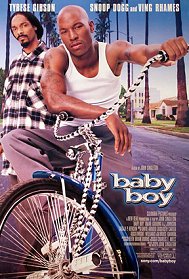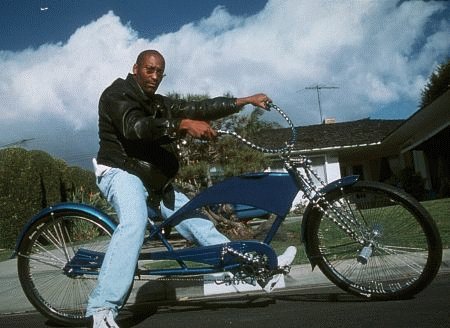| www.johnsingletonfilms.com | THE FILMS OF JOHN SINGLETON |


|
 Given the fact that Baby Boy marks writer-director John Singleton's cinematic return to the 'hood of South Central Los Angeles a full decade after his acclaimed debut Boyz N the Hood, it makes sense for Columbia Pictures to play up the connection to that seminal double Academy Award nominee in its advertising campaign. However, the sure-to-be constant comparisons (which are further encouraged by erroneous reports calling Baby Boy a sequel to Boyz) will only be a disservice to what is a distinctive and worthy film in its own right.
Given the fact that Baby Boy marks writer-director John Singleton's cinematic return to the 'hood of South Central Los Angeles a full decade after his acclaimed debut Boyz N the Hood, it makes sense for Columbia Pictures to play up the connection to that seminal double Academy Award nominee in its advertising campaign. However, the sure-to-be constant comparisons (which are further encouraged by erroneous reports calling Baby Boy a sequel to Boyz) will only be a disservice to what is a distinctive and worthy film in its own right.While not a Boyz sequel, Baby Boy can be seen as a companion of sorts since it also traces a young African-American man's coming of age in South Central. Similarities end, though, with the central character, Jody (Tyrese Gibson). Jody is 20-years-old and father of two children by two different women, yet he's a layabout who still lives with his rather young mother, Juanita (A.J. Johnson). Jody, who spends most of his days hanging out with his equally directionless best friend Sweetpea (Omar Gooding) is every bit as selfish and immature as he sounds, and while this has an unavoidable distancing effect on the audience, it's a credit to Singleton and Gibson that they don't sugarcoat Jody's unsympathetic qualities. Whenever his girlfriend (and mother to his eldest child) Yvette (Taraji P. Henson), Juanita, or her O.G. boyfriend Melvin (Ving Rhames) express their frustration with Jody's behavior, one feels their impatience right along with them--as one should. Jody's belligerent act is often laid on a bit thick, as if his outbursts are less a natural result of his short temper than it is the manner in which he believes people expect him to behave. His biggest problem, it becomes clear, is not his attitude but his buying into the fatalist mindset of the young inner city black male. The image of his own death recurs in his dreams and thoughts, but the visions don't really "haunt" him per se; he seems to welcome them, as if being a "man" is to constantly prepare himself for dying. But Jody isn't beyond redemption and/or redirection, and ironically a great deal of his buried sincerity comes through in his rather destructive relationship with Yvette. Baby Boy may in essence be a study of Jody, but the heart of the film is Jody and Yvette's tortured romance. Their moments of tenderness, and the chemistry between Gibson and Henson, convince that these two people genuinely love and care for each other. But those pure moments are rare, and one is left to wonder if their feelings are worth all the pain they put each other and themselves through. Singleton points no fingers, for both parties do their part in perpetuating the vicious love/hate cycle. "Baby boy" Jody constantly cheats on her; the ever-suspicious but easily forgiving Yvette can't bring herself to leave him, at least not for very long. The two screen newcomers are nothing short of exceptional in the leads. Given how abrasive his character is a lot of the time, the strong charisma that Gibson has previously exhibited in his music, TV hosting, and modeling careers is key to the character's engagement of the audience. Gibson's natural presence hooks the viewers in, and thankfully he has the solid acting chops to keep them riveted. He's more than able to hold his own with the seasoned likes of Rhames and Johnson (who are also terrific), and he is able to subtly convey what's behind Jody's tough veneer: vulnerability, self-doubt, and, to a certain degree, self-loathing. Considering a number of Yvette's scenes involve her angrily yelling at Jody, the true worth of Henson's work can all too easily be discounted; there's real soul behind the sometimes shrill surface. Most indelible is a nonverbal scene where a teary Yvette envisions--as he sexually services her--what a life spent with him could be like. If pictures speak a thousand words, the looks on her face speak a million. The largely internal nature of the drama in Baby Boy is gripping enough that it's a bit of a letdown when external conflict arises. When Snoop Dogg turns up as Rodney, Yvette's just-paroled--but hardly reformed--convict ex, Singleton ends up retracing steps he and many other filmmakers have taken in the past. This is not to say that he doesn't find some fresh spin, but for a film that had taken a hard look at difficult people in difficult situations, this narrative direction seems a bit too easy, making way for a resolution is a little too tidy. Nonetheless, however diluted the film's initial power feels at the end, with Baby Boy Singleton has again succeeded in making a thoughtful and provocative film that long resonates in the mind.
--Review by Michael Dequina, from The Movie Report#282, June 13, 2001
|
|
||||||
 |
|
Films News Biography |
 |
Photos About Guestbook |
 |